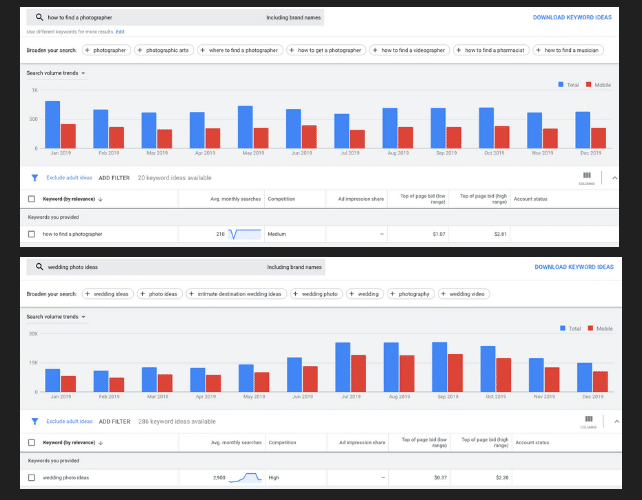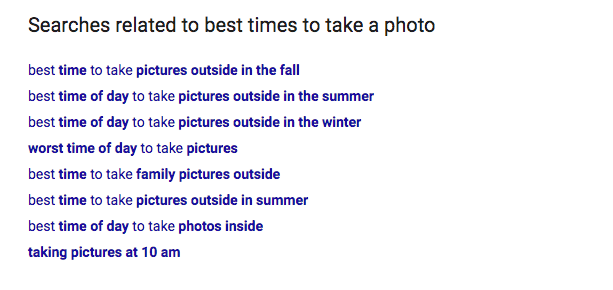
Any content you add to your site, from new pages to blog posts to videos and more, will help potential customers find your website. However, the best type of content continually generates traffic, generates strong backlinks to boost your SEO, and increases conversions from visitors to customers or subscribers. This content is considered ‘evergreen;’ it’s continually useful to your audience and remains valuable over time. Finding evergreen content topics in your niche can be a challenge. Here are some tips on how to find evergreen content topics that will bring value and visitors to your website.
5 Ways to Find Evergreen Content Topics That Will Continually Drive Traffic
Evergreen content might be a popular blog post or a permanent page on your website. This type of content consistently brings traffic to your site because it answers questions or explains a topic that consistently drives interest. The opposite is timely or seasonal content—it only generates interest for a brief time, or only during a certain time of year. Any industry, including B2B and B2C businesses, can have evergreen, timely, or seasonal content. The key to finding evergreen content topics is knowing what your web visitors are consistently interested in, and how to write about it so users can find it and Google can rank it.
Use the following strategies to find evergreen content topics for your site.
1. Keyword Research
Keyword research can be valuable to your SEO, but it can also show interest in topics related to your industry. It will not only show how much users are searching these terms, but also when they’re searching. This will show whether a topic idea has seasonal interest, or consistent interest throughout the year.

Good Keyword Planner shoes how much users are searching a word or phrase, and when they’re searching it.
For example, let’s say you own a photography business. Maybe you have a few ideas for your upcoming biweekly blog post. According to Google Keyword Planner, the search “wedding photo ideas” generates interest, but mainly during the summer, when many people plan their weddings. This might still be a high-quality blog post if you update it regularly, but it will probably bring in less traffic during the winter. However, a post like “how to find a photographer” gets more consistent traffic throughout the year. This could be good evergreen content for your site.
2. Research Competitors
While it’s obviously bad practice to copy your competitors’ content, you can look to your rivals for some topic guidance. SEO tools like Moz, Ahrefs and Majestic can show you which pages get the most backlinks, shares, and traffic on any given website. You might look at popular blog posts your competitors have written, or informational pages they use to generate reliable traffic.
You can take this one step further by targeting your competitor’s popular pages and also looking for weaknesses in the content. If their page is very well-written, informative, or uses independent research, it will be tougher to outrank them in a search for the same keywords. However, if the content is fairly loose, has a lot of errors, doesn’t contain much research, or doesn’t use ideal keywords, you might be able to gain a higher spot, and generate even more traffic to your site.
3. Q&A Sites

Question and answer sites like Stack Exchange can show questions users want to know, and reveal evergreen content topics.
Long-tail keywords, such as questions, can be valuable for evergreen content, however they are often too specific to appear in keyword research. It’s tempting to guess what your customers want to know about, or to simply write about a topic that interests you. While this can result in evergreen content, it’s equally possible you’ll end up with content that is too specific. It’s better to start with some data. Question and answer sites, such as Quora, Yahoo Answers, or Stack Exchange, will show what questions people are asking about your industry.
Returning to our photography business example, let’s say you want to write about the differences between your old NikonD3400 and your new NikonD850. Even if you write an informative, well-written comparison, it’s probably too specific to generate a lot of interest. Furthermore, as new camera models come out, interest in your content will fade. The Q&A site Stack Exchange provides a similar topic that will probably generate more interest; “What makes a camera ‘professional’ vs amateur/hobbyist?” A comparison of different types of cameras by their level of professionalism would answer this question, and it would show your expertise. After you write this content on your site, return to the original question to briefly answer it, and provide a link to your content for further reading. This way, you’ll start generating traffic right away.
4. Common Questions
You probably have questions that customers ask you all the time. If you’ve heard the same question more than once, there’s a good chance that other people have this question too. Do some keyword research to find the best way to phrase this question and answer so search engines and users can find it. Then, answer it. Even if the question seems specific or you can’t find much keyword data on it, give it a try anyway. Maybe the question is only specific to your area, but it may still be a question lots of other locals want to know, so it can be a great evergreen content topic that probably doesn’t have much competition. This means you’ll win the top spot and all or most of the traffic.
For example, if you’re a photographer in Metro Detroit, you may have heard people ask you about the best photo spots. This could be a great evergreen content topic. Write about your favorite photo spots, when to visit, how to get there, and don’t forget to include great pictures. To turn some of these visits into customers, point out areas that could be great for wedding photos, senior pictures, family photos, professional photos, or even great shots for artists and music groups. There’s a good chance a visitor looking for these types of photos in the Metro Detroit area will be impressed with your work, and contact you.
Not only will you generate traffic with this strategy, but you can also stop answering the same old question! When someone asks again, politely refer them to your blog post or web page for more information.
5. Related Searches

At the bottom of a SERP, Google will suggest other, similar searches that can be evergreen content topics.
As you’ve searched for evergreen content topics, you’ve probably found a few that were simply too competitive, or there was not enough interest to write about. If you feel like you’re on the right track, but not quite there yet, Google’s related searches feature can help. At the bottom of a Google search engine results page (SERP), you might see a “Searches related to…” section. This shows similar phrases or questions users have asked. Some of these might be specific, so they won’t show up in keyword data. However, the related searches feature shows that there is some interest.
Let’s say you want to write about “the best times to take a photo.” However, there’s already so much content written on this, you’re not sure you can compete. At the bottom of the page, you’ll see a variety of other related searches. Many of these, like “best time to take pictures outside in the fall” will be seasonal, so they’re not evergreen content topics. However, a topic like “best time of day to take photos inside” could be just what you’re looking for.
Remember that your traffic is not only related to the type of content and topic you use, but also how well you create it and how it ranks. To write a great blog post or page and rank well on any keyword, especially those that are competitive, you’ll need to cover the topic in depth, provide references and graphs where you can, use images, and use the keyphrase and its synonyms. This can be a challenge, but you can always go back and expand, update, or improve your blog posts as you practice.
